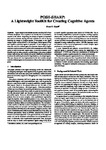POSH-SHARP: A lightweight toolkit for creating cognitive agents
| dc.contributor.author | Gaudl, Swen | |
| dc.date.accessioned | 2019-10-30T14:13:16Z | |
| dc.date.available | 2019-10-30T14:13:16Z | |
| dc.date.issued | 2018-01-01 | |
| dc.identifier.uri | http://hdl.handle.net/10026.1/15091 | |
| dc.description.abstract |
Agent design is an intricate process requiring skills from different disciplines. Thus experts in one domain are not necessarily experts in the others. Supporting the design of agents is important and needs to address varying skill and expertise as well as varying handling the design of complex agents. In this paper, a new agent design toolkit –POSH-SHARP– for intelligent virtual agents (IVAs) and cognitive embodied agents is presented. It was designed to address the need for a robust agent development framework in highly restrictive environments such as the web or smartphones while being useful to both novice and expert users. It includes advanced functionality such as debug support, explicit design rules using a related design methodology and a simple set-up and distribution mechanism to reduce the authoring burden for large iteratively developed agents. The new framework was implemented in C# and contains sample code for different game environments to offer novice users a starting point. | |
| dc.language.iso | en | |
| dc.rights | Attribution-NonCommercial 4.0 International | |
| dc.rights | Attribution-NonCommercial 4.0 International | |
| dc.rights | Attribution-NonCommercial 4.0 International | |
| dc.rights | Attribution-NonCommercial 4.0 International | |
| dc.rights | Attribution-NonCommercial 4.0 International | |
| dc.rights.uri | http://creativecommons.org/licenses/by-nc/4.0/ | |
| dc.rights.uri | http://creativecommons.org/licenses/by-nc/4.0/ | |
| dc.rights.uri | http://creativecommons.org/licenses/by-nc/4.0/ | |
| dc.rights.uri | http://creativecommons.org/licenses/by-nc/4.0/ | |
| dc.rights.uri | http://creativecommons.org/licenses/by-nc/4.0/ | |
| dc.title | POSH-SHARP: A lightweight toolkit for creating cognitive agents | |
| dc.type | conference | |
| dc.type | Conference Proceeding | |
| plymouth.publication-status | Published | |
| plymouth.journal | Proceedings of AISB Annual Convention 2018 | |
| plymouth.organisational-group | /Plymouth | |
| plymouth.organisational-group | /Plymouth/Faculty of Science and Engineering | |
| plymouth.organisational-group | /Plymouth/Faculty of Science and Engineering/School of Engineering, Computing and Mathematics | |
| plymouth.organisational-group | /Plymouth/REF 2021 Researchers by UoA | |
| plymouth.organisational-group | /Plymouth/REF 2021 Researchers by UoA/UoA11 Computer Science and Informatics | |
| plymouth.organisational-group | /Plymouth/Users by role | |
| plymouth.organisational-group | /Plymouth/Users by role/Academics | |
| dc.rights.embargoperiod | Not known | |
| rioxxterms.licenseref.uri | http://creativecommons.org/licenses/by-nc/4.0/ | |
| rioxxterms.type | Conference Paper/Proceeding/Abstract |



